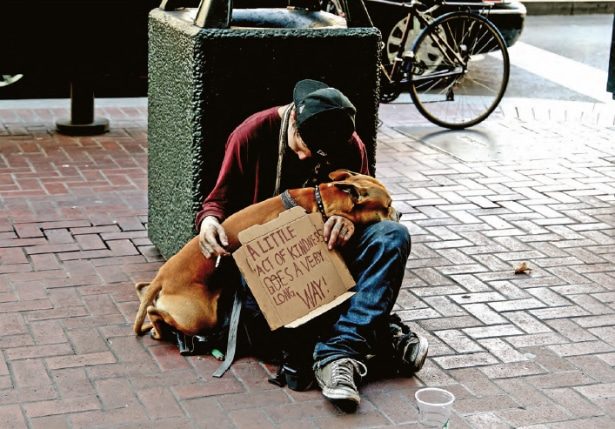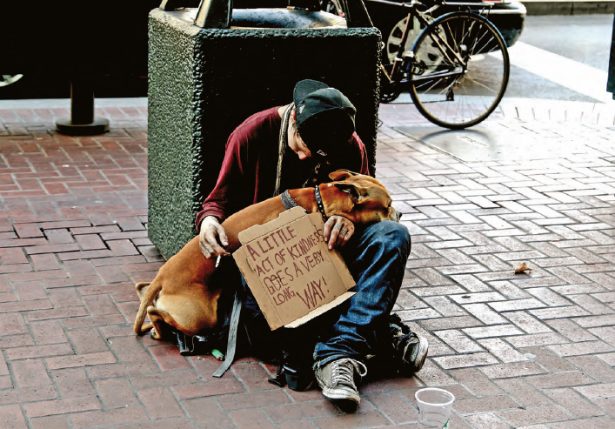

Dogs of the Homeless
For many people on the streets, dogs provide the love and support needed to get through the day—and in return, these dogs are loved and cared for right back
Marlena was just 14 when she found herself homeless. With escalating conflict at home, she thought it would be better not to live with her family.
“I dropped out of school and was an outcast, but I found a new crowd in Vancouver [BC] and that crowd happened to be homeless,” she says. Sleeping in parks or on beaches, Marlena made most of her income panhandling or squeegying car windows. Hygiene took a back seat to eating and sleeping. Drugs helped to fill some of the empty hours.
Then she got a dog.
“It was 1999, a year after I became homeless. He was a Pit Bull/chocolate Lab, just under 12 weeks old. I named him Dioji,” says Marlena who lived on the streets from 1998 until 2002.
It was, initially, more about what a dog could offer her rather than what she could offer the dog. Her street friends had dogs and she wanted a companion 24/7 who wouldn’t judge her and who would love her 100 percent every day. Nonetheless, “the dog always came first,” she says. “He ate first and instead of wasting my money on drugs, I put the money into the dog. In a way, he kind of saved my life. He was more important than sitting in an alley getting high. Instead of blowing my money on stuff, I had a priority. He was my priority.”
Dioji was constantly attached to her and always at her hand. She was proactive in training him and never left him with anyone. He was, she says, the most important thing she had.
“I didn’t even get a slice of pizza until he had food,” she says. Dioji stayed with her while on the street and then lived with her when she found housing, eventually passing away of old age and poor health just before Christmas 2013.
John Kehler, a senior support worker with Directions Youth Services, a resource program for youth in crisis, sees a lot of homeless youth with dogs. The youth typically divert their own scarce financial resources to their dogs, perhaps because many of these youth relate better to their dogs than to people—unless it’s to people who understand dogs. “A dog promotes interaction,” he notes.
As for people who worry that the dogs of the homeless are perhaps neglected or mistreated, Kehler dismisses this. “No one treats a dog poorly on the street. The street doesn’t tolerate that. They are quite comfortable calling people on poor behaviour.”
Veterinarian Dr. Shawn Llewellyn is a board member at Paws for Hope, a Vancouver-based charity committed to sustainable companion animal protection. Through its Roxy’s Relief program, he provides support to street-involved or lowincome pet guardians through donations of food and bedding and by offering free animal health clinics.
Dr. Shawn, as he is known, sees firsthand the number of street people deeply connected to and reliant upon their dogs.
The dogs “are a huge part of their lives. In some cases, the dogs are what keep people with us. They don’t give up [because of their dogs],” he says. “People will choose the street over shelter, rather than give up their dog. It is total devotion.”
Some owners have already given up on most of the supports we take for granted; without their dogs, they might give up on life.
“It’s a huge connection,” Dr. Shawn notes. “They rely on their pets to feel needed. It’s a two-way codependency. It gives them something to live for. They put the dogs before themselves.”
(Start noting how many dogs you see sitting on blankets while their owners sit on the sidewalk for a quick way to ascertain the truth of this statement.)
“What I see in practice and at Paws for Hope is these dogs are taken care of,” Dr. Shawn says. [Owners] try their best to seek assistance. There is no increased risk of health issues. There’s no overpopulation problem. They are fed. They are taken care of.” And because the dogs are with the owners almost constantly, the dogs are happy and calm.
Paws for Hope holds clinic days where homeless people can bring in their pets for basic veterinary care at a location they are already comfortable visiting. Usually held in a human-partner facility, dogs can get a check-up, vaccination, flea check, deworming or even blood work or even minor surgery at a partner veterinary clinic. The dogs are followed-up on if further treatment is needed.
That’s what happened with Bogatai, a very old Mastiff who limped into one clinic. His owner knew something wasn’t right and sought out Dr Shawn for help.
“We helped get him on anti-inflammatories for his painful joints. We provided supplies for enough comfort for as long as the dog had left,” he says, adding that Bogatai’s owner simply makes contact with his own human support workers who contact Dr. Shawn for more medication.
Fester is another example. The small Shih Tzu-cross had a few lumps and bumps that bothered him. He would scratch and lick and his owner was concerned about the dog’s health.
“He came to a clinic very anxious and frustrated and not able to facilitate care [of the dog on his own] but knew the dog needed it. He came to see what we offered and he accepted it readily.”
Fester ultimately went to a partner clinic and received necessary veterinary care and is now doing well.
Dr. Shawn sees his job as helping to ensure that the homeless population gets to care for and keep their dogs so those dogs don’t end up in shelters or alone on the streets.
“These dogs are well-behaved and generally healthy,” he says. “There’s a lot more that could be done to help the human population but we don’t want to forget about the important role these dogs play in their lives,” he says.
Holly E. (she asked that we don’t use her last name) once saw a Pit Bull walking on a leash with a homeless person and wondered how the dog got fed. With a friend, she began Vancouverbased Best Friends for Life, a volunteer effort comprised of just two ladies coming together to collect food and supplies for street dogs. With eight donation bins in the City, they collect and repackage food (homeless people cannot handle large bags or multiple tins of food), as well as new or gently used leashes, collars, and other supplies.
It isn’t a registered charity and they like it that way, as it is easier to build trust with the homeless population when they only see the same two women bringing food.
“They wait for us,” she says. “We go every two weeks to distribute what we have at the same time, same place.” On average they help 10 to 20 animals each visit.
“We know most dogs’ names. All are extremely well mannered and well taken care of. None are underweight or look ill. The animals come first and their owners are grateful, as they are not worried how they will feed their dogs…These dogs are really loved.” Holly has partnered with a business close to one homeless man to hold the canned dog food so the dog owner can grab four cans a day for his two dogs.
“He can go on his own. He is very appreciative but we want him to feel independent. He takes care of his own pet,” she says. The dogs, Rex and Roach, are about to enjoy a donated grooming, as their owner said he wanted to do something nice for his dogs.
“They’re family,” Holly says of street dogs. “They love unconditionally. The dogs don’t care if their owners haven’t bathed; haven’t brushed their teeth. They don’t care if they’re high. They don’t judge them.”
One thing is certain: for many of the homeless, having a dogchanges the dynamic. As much as these dog owners care for their dogs, the greater gift is what these dogs give back to their owners. No matter what your income is, what type of home you live in, or whether you even have a home, dogs are constant friends: devoted, dependable, and determined to serve us. They see us for who we are, not how others view us, just as Marlena’s best friend Dioji did.
“He was always there for me. Through an abusive relationship, he was my rock. He knew every time I felt down and he was right there. He protected me; he loved me. He was an awesome dog.” Wherever you live, I think this is a sentiment all dog people can relate to.
Join the newsletter and never miss out on dog content again!
"*" indicates required fields
By clicking the arrow, you agree to our web Terms of Use and Privacy & Cookie Policy. Easy unsubscribe links are provided in every email.